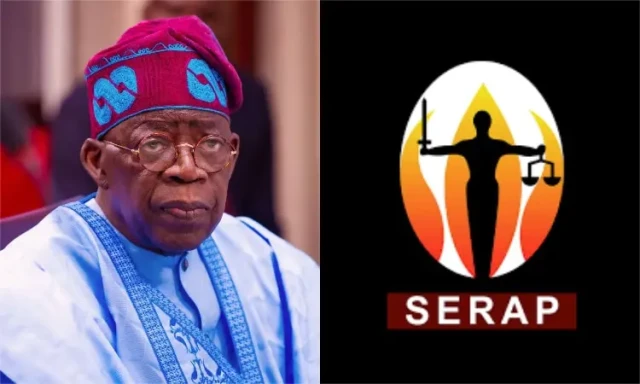In light of the recent incidents of violence in Benue State, the Socio-Economic Rights and Accountability Project (SERAP) has urged President Bola Tinubu to promptly submit the matter to the International Criminal Court (ICC) to ensure justice for the victims and hold those responsible accountable for serious violations of international law.
This request was made in a statement released on Sunday by Deputy Director Kolawole Oluwadare, who noted that such a referral would underscore the president's dedication to safeguarding human rights and upholding the rule of law.
SERAP emphasized that the president should "immediately refer the situation in Benue State to the ICC for the court to take jurisdiction over the violence, unlawful killings, and other serious breaches of international humanitarian and human rights law occurring in the region."
The organization also encouraged the president to contemplate referring the ongoing violence and serious violations of human rights law in other states of Nigeria, or to ask the ICC prosecutor to broaden current inquiries into Nigeria to include those states.
They added, “Referring the situation in Benue State to the ICC would contribute to fulfilling your stated commitment to ‘hunt down the perpetrators of the attacks and bring them to justice, ensure justice for victims, and restore peace in the region.’” SERAP reiterated the urgent need for accountability for these violent mass killings, irrespective of whether the perpetrators are state or non-state actors, or a combination of both.
They stated, “A referral from your government to the ICC would bring the situation to the Prosecutor’s attention to assess whether human rights violations and international crimes have occurred in the state and to identify those responsible.”
SERAP warned that any hesitance to refer the Benue situation to the ICC would only encourage both state and non-state actors to continue their assaults on the state's populace without fear of repercussions. Many individuals linked to these violent attacks have managed to evade justice thus far.
“Considering the alleged involvement of state actors in the issues faced in Benue and other regions experiencing severe human rights violations and international crimes, domestic avenues have proven to be inadequate and insufficient to deliver accountability and justice to victims and their families.”
They noted that “The ICC’s jurisdiction extends to individuals who may be shielded from national prosecution, including high-ranking political and military leaders who might be complicit in grave human rights abuses in Benue and other parts of Nigeria, such as Zamfara, Kebbi, Sokoto, Plateau, Taraba, and Borno states.”
“Under Article 14 of the Rome Statute, Nigeria, as a state party to the treaty, can request the ICC prosecutor to investigate serious human rights violations and crimes under international law that have occurred in Benue.”
SERAP clarified that referring the situation in Benue to the ICC would be relatively straightforward for the Nigerian government, stating, “The referral of the situation in Benue to the ICC is not a complicated process, as Article 14 of the Rome Statute does not impose evidentiary requirements on Nigeria.
“Any referral by your government would immediately obligate the ICC prosecutor to initiate an investigation into the situation in Benue or to evaluate if there is a reasonable basis to do so.
This referral would also exempt the prosecutor from needing Pre-Trial Chamber authorization to commence an investigation. The ICC prosecutor would have access to admissible evidence regarding the situation in Benue that might not be readily available to Nigerian law enforcement and security forces.”
The organization highlighted the pervasive and enduring nature of human rights violations in Benue and other regions, stating, “These serious human rights abuses and international law crimes have afflicted Benue and various other states for far too long, resulting in the loss of many Nigerian lives and leading to significant displacements.”
SERAP posited that Nigeria’s membership in the ICC presents a chance to uphold justice and restore faith in the rule of law. “The Rome Statute of the ICC grants your government a unique opportunity to address the ongoing serious human rights violations in Benue and elsewhere, ensuring justice for victims.
“Justice is not a negotiable extra; it is a crucial requirement for vindicating individuals' rights. A referral to the ICC would ultimately strengthen Nigeria’s domestic justice system’s capability to prevent and address these human rights violations.”
The group pointed out that other African nations have previously referred cases to the ICC, urging Nigeria to follow suit, remarking, “Nigeria would not be the first to approach the ICC, as nations such as Gabon, Mali, Uganda, the Democratic Republic of the Congo (DRC), and the Central African Republic (CAR) have done before.”
SERAP, however, issued a one-week timeframe for action, indicating that other ICC member states might intervene if the Nigerian government does not respond. “We would appreciate if the suggested measures are implemented within seven days of receiving and/or publishing this letter.
Should we not receive a response by then, SERAP will consider petitioning the states parties to the Rome Statute to refer the situation in Benue to the ICC, urging them to follow examples set by certain states parties in cases like Venezuela.”
The group further underscored that a formal referral would signify a serious commitment to resolving the crisis and restoring justice.
“Referring the situation in Benue to the ICC would demonstrate your stated commitment to addressing the human rights crisis in the state and send a potent message to those who commit grave violations of international law—that they will be brought to justice.”




















